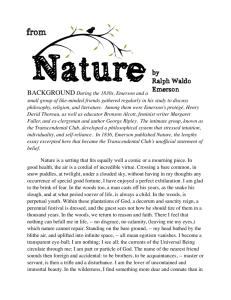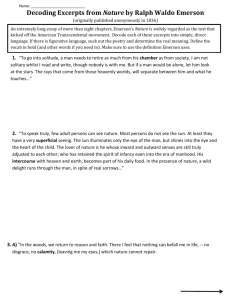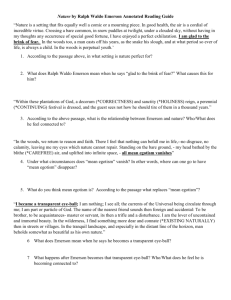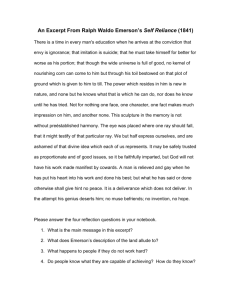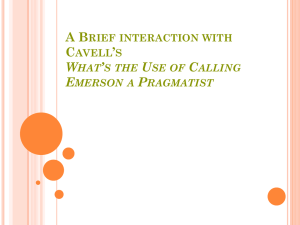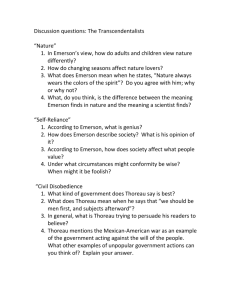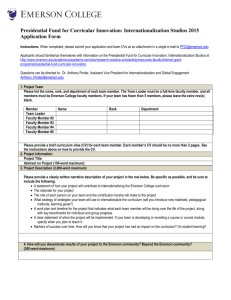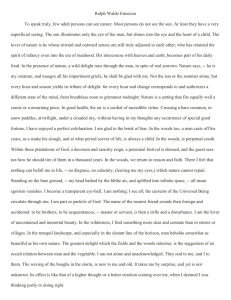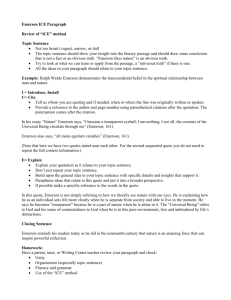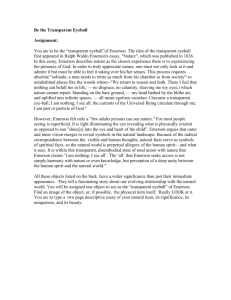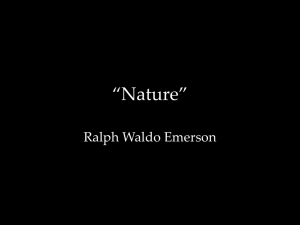Emerson's Nature: Transcendentalism & Human-Nature Connection
advertisement
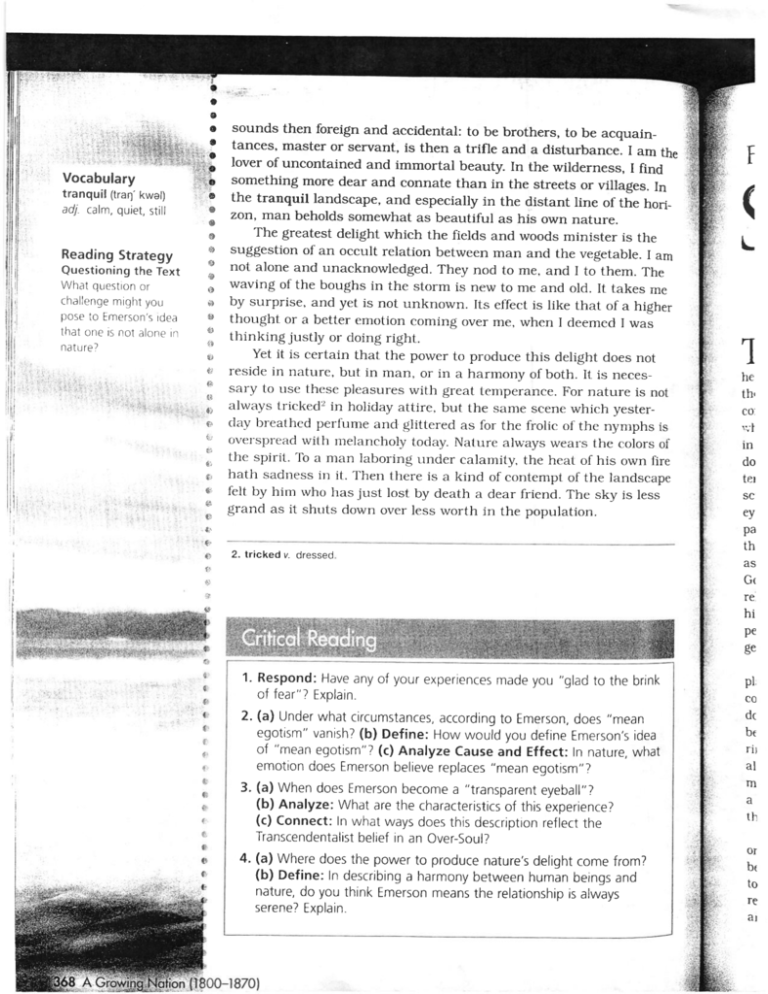
t
a
e
sounds then foreign and accidental: to be brothers, to be acquaintances, master or servant, is then a trifle and a disturbance. I am
the
o
lover of uncontained and immortal beauty. In the wilderness, I find
something more dear and connate than in the streets or villages.
In
6 the tranquil landscape, and
especially in the distant line of the hori_
s zon, man
beholds somewhat as beautiful as his own nature.
The
greatest
delight which the fields and woods minister is the
o
I suggestion of an occult relation between man and the vegetable.
I am
I not alone and unacknowledged.
They
nod
to
me,
and
I
to
them.
The
&
o waving of the boughs in the storm is new to me and old. It takes me
a by surprise, and yet is not unknown. Its effect is like that of a higher
a thought or a better emotion
coming over me, when I deemed I was
#
justly
thinking
or
doing
right.
t3
Yet it is certain that the power to produce this delight does not
reside in nature, but in man, or in a harmony of both. It is necesFr
sary to use these pleasures wilh great temperance. For nature is not
always tricked2 in holiday attire, but the same scene which yester{F
clay breathed perfume and glittered as for the frolic of the nynrphs is
over-spread wilh rnelancholy today. Nature alw-ays wear-s the colors of
the
spirit. 'fo a man Iaboring under calamity, the heat of his own fire
6:
g!
hath sadness in it. Then there is a kind of contempt of the landscape
&i
felt by him rvho has just lost by death a dear friend. The sky is less
Q:
grand as it shtrts down over less worth in the population.
G
t
Vocabulary
tranquil (tra4'kwal)
adj. calm, quiet, still
t
(
13
Reading Strategy
Questioning the Text
Whal question or
challenge might you
pose to Emerson's rdea
that one is not alone
natu re?
in
A'r
1
lte
th,
CO,
,r"-i
ln
do
ter
SC
ey
pa
*.1
6i
G
L
2. tricked y. dressed
th
AS
l
I
Gr
*;
I
re
e
hi
pe
ge
1. Respond: Have any of your experiences made you ,,glad to the brink
of fear"? Explain.
2. (a) Under what circumstances, according to Emerson, does ,,mean
egotism" vanish? (b) Define: How would you define Emerson,s idea
of "mean egotism"? (c) Analyze Cause and Effect: ln nature, what
emotion does Emerson believe replaces "mean egotism,,?
3. (a) When does Emerson become a "transparent eyeball,.?
(b) Analyze: What are the characteristics of this experience?
(c) Connect: ln what ways does this descriptron reflect the
Transcendentalist belief in an Over-Soul?
4. (a) Where does the power to produce nature's delight come from?
(b) Define: ln describing a harmony between human beinqs and
nature, do you think Emerson means the relationship is always
serene? Explain.
pl
CO
dc
br
rir
al
m
a
rh
OI
br
to
re
al
3
c
C
e
3
3
c
€
e
the TB3osand'
BACKGROUND group
"n"soJ Like-minded
a small
rn hts studg to discuss
Jriend.s gathered' regularly
"phi?osophg,
reltgton, and' Iiterature' Among tlem usere
Emersons protege, Henrg DauidThoreau' as usell
as educator Bronson Alcott, Jeminist uriter Margaret
Fulten and- ex-clergAman and author George Rtpleg'
Tlrc tntimate group, knou-tn as tlrc Transcendental"
stressed
CLub, deueLoped' a plilosophical sgstem that
1836'
In
tntuttton, indiuidualttg, and' self-reliance'
Emerson publtshed' Nature, the Lengthg essau excerpted
here that became the Trolnscenc)entcil club s unolJicial
1B4Os, Emerson and
G
e
e
e
c
6
o
e
6
&
o
G
g
G
u
G
statement oJ belief.
tF
G
e
rl
C
I
o
e
e
:l
G
G
G
G
*
s
G
G
Ei
?,i
B
G-i
il-
b
e
@
p
s
e
@
s
fi
I
G
@
e
,c
o
g
:b
ature is a settin$ that tits equally well a comic
or a ntourning piece' In good health, Lhe air is a
corclial of incredible virtue. Crossing a bare common'r
in snow pucldles, at twilight, under a clouded sky'
without having in my thoughts any occurrence of
special good fortune' I have enjoyed a perfect exhila.u.tio.r. I am glad to the brink of [ear' In the woods'
too. a man casts off his years, as the snake his
slough, and at what period soever of life is always a
r:hild. In the woods is ^oerpetrral youth' Within these
plantations of God, a decorum and sanctity reign'
a perennial festival is dressed' and the guest sees
not how he should tire of them in a thousand years'
In the woods, we return to reason and faith' There I
feel that nothing can befall me in life-no disgrace'
no calamity (leavin$ me my eyes)' which nature cannot repair. Standing on the bare ground-my head
bathed by the blithe air and uplifted into infinite
space-all mean egotism vanishes' I become a transparent eyeball; I am nothing; I see all; the currents
of the Universal Being circulate through me' I am
part or parcel of God. The name of the nearest friend
1. common
{
n. piece of open public land'
Critical Viewing What different
emotions might the
natural setting shown in this photograph evoke in people?
Explain.
ilnterPretl
What effect does Emerson.
believe nature has on all
regardless of age
